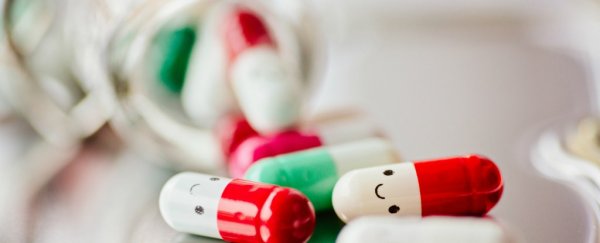Coffee causes cancer. Eggs give you high cholesterol. Lexapro is a scam.
Just kidding.
Health advice these days feels like a game of ping-pong, and the accepted wisdom on antidepressants like Lexapro – one of the most popular drugs used to treat depression – is no exception to that mixed messaging.
In January, writer Johann Hari published a series of personal stories in outlets like The Guardian and the Huffington Post in which he claimed that antidepressant medications didn't help him because "the whole idea that depression is caused by a 'chemically imbalanced' brain is wrong."
Fortunately, a large new review of 500 studies comprising more than 100,000 people and published this week in the medical journal The Lancet, backs up what many experts in the fields of psychiatry and neuroscience have been saying for decades: antidepressants do work.
The review found that the drugs can be powerful tools in the fight against depression, which today remains the leading cause of disability and a major cause of suicide worldwide.
Written by a team of 18 medical doctors and specialists in Europe and England and funded by the UK's Department of Health, the review concluded that all of the 21 antidepressant drugs they studied worked better at treating depression than a placebo.
In direct comparisons of some of the drugs, small differences in the results appeared, with the research suggesting that some medicines like escitalopram (frequently sold under brand-name Lexapro) worked slightly better than drugs like fluoxetine (sold under brand-name Prozac).
Still, antidepressants are not magic tricks.
Evidence suggests that for as many as 78 percent of people, simply taking a pill does not completely erase depression's most insidious symptoms, which can include things like isolating oneself, having disturbing impulses to self-harm, or being so self-critical that it interferes with daily life.
A smaller percentage of people don't respond to medications at all, a troublesome phenomenon known as treatment-resistant depression that remains one of the hardest types of the illness to address.
But for those whose symptoms do subside on antidepressants, they can be a powerful component of a larger treatment plan that might include things like therapy, group counseling, and exercise.
These other parts of treatment plans should not be discounted, as some studies suggest that the right forms may be just as powerful, if not more so, than medications.
Unfortunately, therapy also tends to be expensive and time consuming, which makes it inaccessible to people who are working multiple jobs or can't afford it.
Also, while most antidepressants work better than a placebo, it's still somewhat unclear how much better than a placebo they function.
For the latest review, the researchers found evidence that some medications ranged from being roughly a third more effective to more than twice as effective as a placebo – a fairly wide range.
This means that some people's symptoms may dramatically clear after a few weeks on the right drug while other people get only slight relief.
However, the main takeaway from the latest paper appears to be that for many people, antidepressants can be a helpful part of a broader approach to treatment – and in some cases, they provide powerful relief that isn't available otherwise.
This article was originally published by Business Insider.
More from Business Insider:
